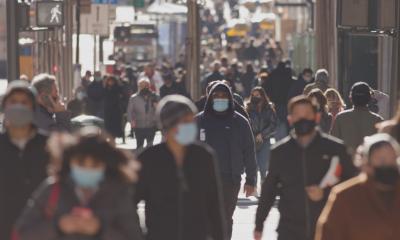Image source: Adobe Stock/gena96
News • Global study finds increase in deaths
Why is Covid-19 more deadly on weekends?
The average number of global deaths from Covid-19 were 6% higher on weekends compared to weekdays (8,532 vs 8,083) throughout the pandemic, according to new research analysing all deaths reported to the WHO Covid-19 database between March 7, 2020 and March 7, 2022. The study is by Dr. Fizza Manzoor and Dr. Donald Redelmeier from the University of Toronto, Canada.
The findings, to be presented at this year’s European Congress of Clinical Microbiology & Infectious Diseases (ECCMID) in Lisbon, Portugal (23-26 April), reveal that the highest absolute increase in weekend Covid-19 deaths was in the USA (average 1,483 weekend deaths vs 1,220 weekday deaths, 22% increase), followed by Brazil (1,061 vs 823, 29% increase), and the UK (239 vs 215, 11% increase). Only Germany reported significantly fewer average deaths at weekends compared to weekdays (137 vs 187). The researchers say that the increase in Covid-19 deaths on weekends is likely to reflect bureaucratic and reporting delays as well as hospital staffing levels and other organisational factors.
Bureaucratic delays on weekends alone do not explain why there are fewer documented Covid-19 deaths on Mondays compared to Fridays
Fizza Manzoor
For the study, researchers calculated the average number of deaths on weekends compared to the average number of deaths that occurred on the preceding Monday to Friday (weekdays). They then repeated the analyses for 10 countries with the highest Covid-19 cases: the USA, UK, France, Germany, Italy, Spain, Russia, India, Brazil, and Canada. Analyses were adjusted for national holidays ad long weekends.
A total of 5,983,471 deaths and 444,961,484 new cases were identified over the two years. Researchers found that, worldwide there were on average 449 more Covid-19 deaths on weekends than weekdays (8,532 vs 8,083). Because healthcare system performance and awareness improved during the pandemic, researchers performed a more detailed evaluation comparing weekend deaths in the earlier half (March 2020 to March 2021) to the latter half (March 2021 to March 2022), and discovered that the increase in weekend deaths remained significant over the 2 years – with an average 641 additional weekend deaths (7,825 vs 7,184) in the first year compared with
an average 257 additional weekend deaths (9,239 vs 8,982) in the second.
Further analyses looking at the average number of Covid-19 deaths on individual days of the week, found that the increase was particularly large when comparing Sunday to Monday (8,850 vs 7,219 deaths) and Friday to Monday (9,086 vs 7,219). The other weekdays showed no particular trend in average number of deaths (Tuesday 6,825; Wednesday 8,070; Thursday 9,230). Additionally, the average number of Covid-19 deaths on the two weekend days were also dissimilar (Saturday 8,850, Sunday 8,071). “Bureaucratic delays on weekends alone do not explain why there are fewer documented Covid-19 deaths on Mondays compared to Fridays, and reporting lags alone cannot explain why the increase in weekend deaths was so substantial in the USA and not seen in Germany”, says Dr Manzoor. “Instead, the ‘weekend effect’ is also likely to be due to shortfalls in clinical staffing, capacity, and experience. What’s more, our findings suggest that this problem is not resolving despite improved health system performance and awareness over the course of the pandemic. There is an opportunity for health systems to further improve clinical care on all days of the week.” She adds, “Further studies, with detailed clinical data are needed to investigate the drivers of and causes for the risk of death on weekdays and weekends from Covid-19.”
Despite these important findings, the authors note that the study could be limited by false negative results, missed cases, and data entry errors, which may affect the conclusions that can be drawn. Additionally, the available data do not account for disease severity or capture the nuanced differences in the microbiologic, systemic, and social factors affecting each separate wave of the pandemic. Finally, the results do not explore the impact of local policies and public health interventions in individual countries.
Source: European Society of Clinical Microbiology and Infectious Diseases
22.04.2022











